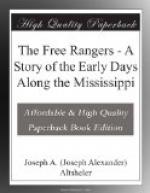Silently the boat slid through the water but they heard again those signal cries, the hoots of the owl and now they were much nearer.
“They must have guessed our course,” whispered Henry, “or perhaps they have heard the splash of an oar now and then. Stop, boys, and let’s see if we can hear their canoes.”
Their boat lay under the thick, spreading boughs of some oaks. Paul could see the branches and twigs showing overhead through the white fog like lace work, but everything else was invisible twenty feet away. All heard, however, now and then the faint splash, splash of paddles, perhaps a hundred yards distant. Henry tried to tell from the sounds how many war canoes might be in the party, and he hazarded a wild guess of twenty. As he listened, the splash grew a little louder. Obviously the canoes were keeping on the right course. Shif’less Sol wet his finger and held it up. When he took it down he whispered in some alarm to Henry:
“The wind has begun to blow, an’ it’s shore to rise. It’ll blow the fog away, an’ we’ll lay in plain sight o’ all o’ them savages.”
Henry’s instinct for generalship rose at once and he saw a plan.
“We must keep on for midstream,” he said. “We know what direction that is, and, out in open water, we’d have one advantage even over their numbers. Theirs are only light canoes, while ours is a big strong boat that will shelter us from any bullet. Pull away, boys! I’ll help Sol keep up the watch.”
The boat once more resumed its progress toward the main current. The wind, as Sol had predicted, rapidly grew stronger. The deep curtain of fog began to thin and lighten. Suddenly a canoe appeared through it and then a second.
A bullet, fired from the first canoe, whizzed dangerously near the head of Shif’less Sol. He replied instantly, but the light was so uncertain and tricky that he missed the savage at whom he had aimed. The heavy bullet instead ploughed through the side and bottom of the bark canoe, which rapidly filled and sank, leaving its occupants struggling in the water. A bullet had come from the second canoe, also, but it flew wild, and then the whitish fog, thick and impenetrable, caught by a contrary current of wind, closed in again.
“Did you hit anything, Sol?” asked Henry.
“Only a canoe, but I busted it all up, an’ they’re swimmin’ from tree to tree until they get to the bank.”
“Now, boys, pull with all your might!” exclaimed Henry, “and, Paul, you steer us clear of trees, brush, logs, and snags. They know where we are and we must get out into the stream, where there’s a chance for our escape.”
Then ensued a flight and running combat in a tricky fog that lifted and closed down over and over again. Henry put down his oars presently and took up his rifle, but Jim Hart and Tom Ross continued to pull, and Paul kept a steady hand on the tiller.
Paul’s task was the most trying of all. Highly sensitive and imaginative, this battle rolling along in alternate dusky light and white obscurity, was to him uncanny and unreal. He saw pink dots of rifle fire in the fog, he caught glimpses now and then of brown, savage faces or the prow of a canoe, and then the heavy fog would come down like a blanket again, shutting out everything.




